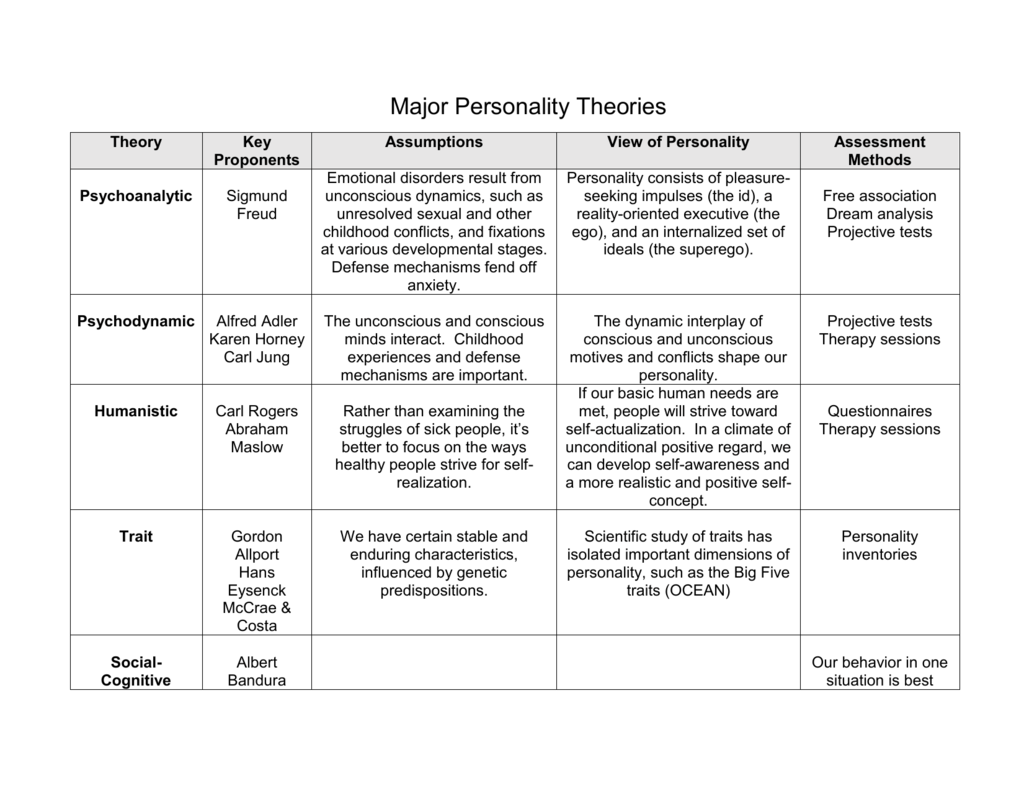Have you ever felt like you weren’t living up to your full potential? Or wondered why others seem to navigate life with a sense of purpose and authenticity that you struggle to find? At the heart of these questions lies the complex and fascinating world of human personality. While countless theories attempt to unravel the mysteries of our inner selves, few have resonated as profoundly as Carl Rogers’ Person-Centered Approach. This revolutionary perspective, far from focusing on deficits or pathologies, emphasizes the fundamental goodness and potential for growth within each individual.

Image: smartdataweek.com
This article will dive deep into Carl Rogers’ groundbreaking theory, exploring its central tenets, applications, and enduring impact on modern psychology. We’ll unpack the core concept of self-actualization, examine the crucial elements of congruence, empathy, and unconditional positive regard, and uncover how these principles can empower you to live a more fulfilling life. Get ready to embark on a journey of self-discovery and unlock the extraordinary potential that lies within you.
The Seeds of Humanistic Psychology: Carl Rogers’ Revolutionary Vision
Before delving into the specifics, let’s paint a bigger picture. Carl Rogers, a prominent American psychologist, emerged in the 1940s as a leading figure in the field of humanistic psychology. At a time when psychology was dominated by behaviorism and psychoanalysis, Rogers dared to challenge the prevailing paradigms. He believed that individuals, inherently driven by a “growth force,” possess an innate capacity for self-actualization – the realization of their full potential.
Rogers’ theory emerged from his clinical practice as a therapist. He observed that clients who felt truly understood and accepted by their therapist experienced significant growth and healing. These observations led him to formulate his “person-centered approach,” which emphasizes the client’s subjective experience and their unique journey towards self-discovery.
Unpacking the Core Concepts: Understanding the Building Blocks of the Person-Centered Approach
At the heart of Carl Rogers’ theory lie three fundamental concepts:
1. The Self-Concept: A Powerful Force Shaping Our Perceptions
The self-concept, according to Rogers, represents our organized perceptions about ourselves, including our traits, beliefs, values, and experiences. It acts as a powerful filter, shaping how we interpret our world and interact with others. A crucial aspect of the self-concept is the “ideal self,” our vision for who we aspire to be. When there is a significant gap between our actual self and our ideal self, we experience incongruence, leading to anxiety, stress, and a sense of disconnect.
2. Congruence: The Key to Authentic Living
Congruence, often referred to as “genuineness” or “authenticity,” refers to the alignment between our inner feelings, thoughts, and outward behaviors. When we are congruent, we live in harmony with our true selves. We express our emotions openly and honestly, without feeling the need to hide or distort our experiences. Congruence is essential for healthy psychological well-being, fostering trust in relationships and facilitating personal growth.
3. Empathy: Stepping Into Another’s Shoes
Empathy, the ability to understand and feel another person’s emotions as if they were our own, plays a crucial role in Rogers’ theory. It goes beyond simply listening or showing sympathy; it involves truly understanding the other person’s perspective and experiencing the world through their eyes. Empathy is the cornerstone of effective communication and a powerful tool for building strong and meaningful relationships.
4. Unconditional Positive Regard: The Foundation of Acceptance and Growth
Unconditional positive regard, often referred to as “unconditional love,” is the bedrock of Rogers’ theory. It refers to accepting and valuing another person completely and unconditionally, regardless of their thoughts, feelings, or behaviors. When we feel truly seen and accepted for who we are, we are free to explore our potential without fear of judgment or rejection. This sense of unconditional acceptance fosters a safe and supportive environment for growth and personal transformation.

Image: www.hotzxgirl.com
Carl Rogers Theory Of Personality Pdf
Putting Theory into Practice: Real-World Applications of Carl Rogers’ Approach
Carl Rogers’ theory has had a profound impact on various therapeutic approaches, educational practices, and even everyday interpersonal relationships. Here are some key applications:
1. Client-Centered Therapy: Unlocking Potential Through Empathetic Connection
Carl Rogers’ person-centered approach forms the foundation of client-centered therapy, a widely adopted therapeutic modality. This approach emphasizes the client’s autonomy and self-healing abilities. Therapists strive to create a therapeutic atmosphere of unconditional positive regard, empathy, and congruence. They listen attentively, reflect back the client’s experiences, and avoid trying to impose their own interpretations or solutions. The focus is on fostering the client’s self-awareness, understanding their feelings, and ultimately guiding them towards self-acceptance and personal growth.
2. Education: Fostering Creativity and Authentic Learning
Rogers’ principles have also influenced educational practices, particularly in student-centered learning approaches. The focus shifts from rote memorization and external rewards to creating an environment that encourages self-directed learning, critical thinking, and creativity.
Teachers who embrace these principles act as facilitators, guiding students towards their own discoveries and encouraging them to take ownership of their learning.
3. Building Strong Relationships: Connecting Through Empathy and Acceptance
Beyond therapy and education, Rogers’ theory offers valuable insights into building meaningful relationships. By practicing empathy and unconditional positive regard in our daily interactions, we can foster deeper connections with others. We can listen with an open heart, truly understand their perspectives, and accept them for who they are,
even when we disagree. This creates a foundation of trust and respect, leading to more fulfilling relationships.






